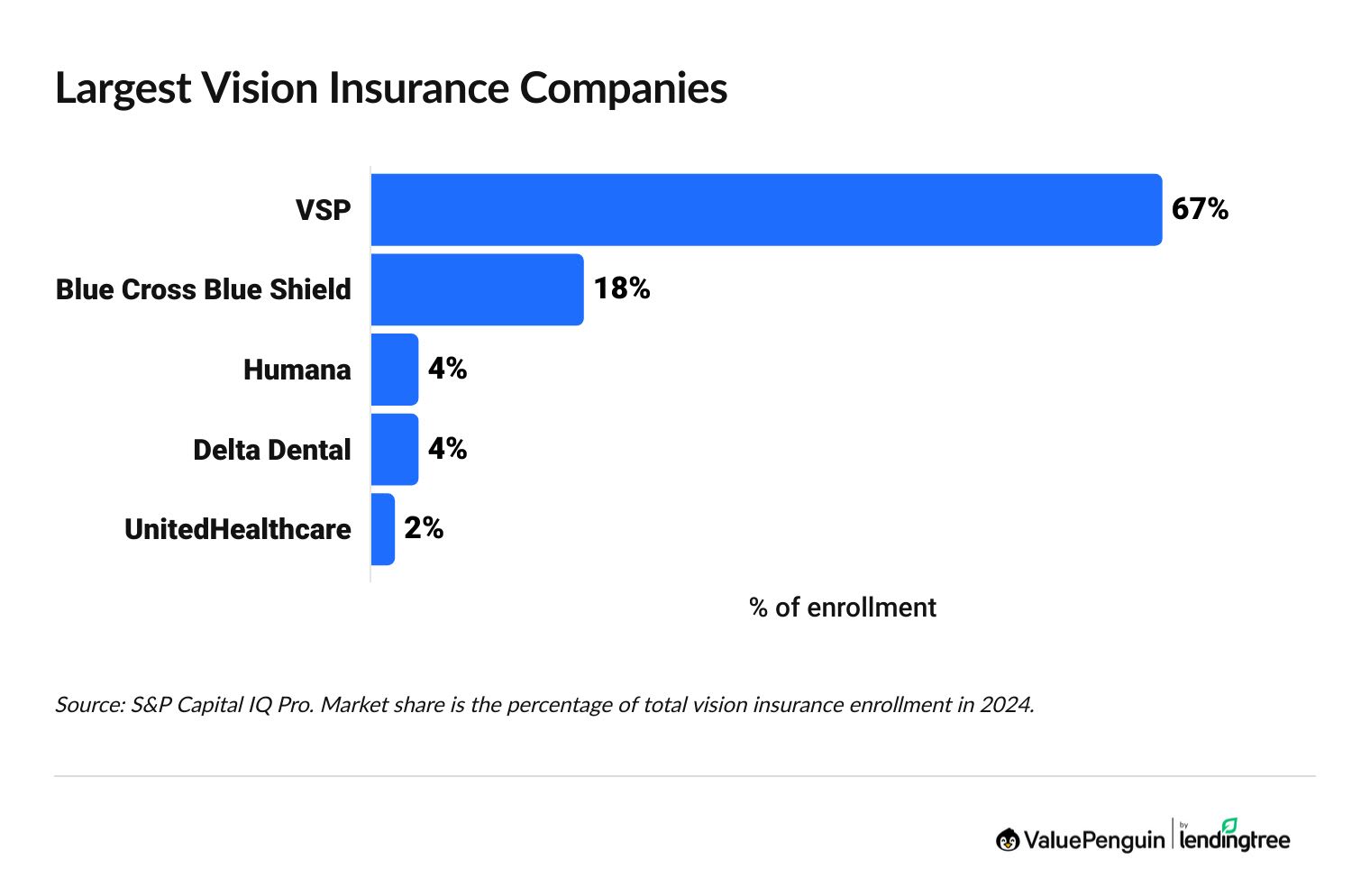What Are the Largest Vision Insurance Companies?
VSP is the biggest vision insurance company in America. About two-thirds of people with a stand-alone vision insurance plan have VSP.
Find Cheap Health and Vision Insurance Quotes in Your Area
Largest vision insurance companies
What are the biggest vision insurance companies?
VSP is the largest vision insurance company in the country by far.
About two-thirds of people with a stand-alone vision insurance plan have VSP. Only 18% have coverage from the second-largest company, Blue Cross Blue Shield.

Vision insurance pays for things like yearly eye exams, contacts and glasses. If you have a medical issue with your eyes, like glaucoma or cataracts, your health insurance plan usually covers it. Vision plans are a type of secondary insurance that gives you coverage beyond what health insurance offers.
Find Cheap Health and Vision Insurance Quotes in Your Area
Largest vision insurance companies
Company | Enrollment | % of market | |
|---|---|---|---|
| VSP | 28.6 million | 67% | |
| BCBS | 7.6 million | 18% | |
| Humana | 1.8 million | 4% | |
| Delta Dental | 1.8 million | 4% | |
| United Healthcare | 782,527 | 2% |
Source: S&P Capital IQ Pro. Top 10 insurance companies by enrollment in vision-only insurance plans as of 2024.
EyeMed is also a common vision insurance option. But the plans that you buy from EyeMed are actually from Fidelity Security Life Insurance Company and Fidelity Security Life Insurance Company of New York. The company also sells plans by partnering with other insurance companies, like Aetna and Delta Dental.
Some health insurance plans include vision coverage, which means you don't need a separate vision insurance plan. Check with your insurance company before you shop or buy a plan. And remember that children's vision coverage is always included in plans that you buy on HealthCare.gov.
If you need a separate vision insurance plan, you have to shop with an insurance company or agent. You can't buy stand-alone vision insurance on HealthCare.gov.
1. VSP
VSP dominates the vision insurance market with 67% of individual plans.
- Market share: 67%
- Enrollment: 28.6 million
VSP Vision Care is the largest vision insurance company in the country by far. More than 28 million people in the U.S. have a personal VSP plan.
And that's just a fraction of VSP's total members because most of the company's business comes from plans that companies offer their workers, called group insurance plans. In total, VSP says it has over 85 million members.
VSP is also easy to use. The company says it has almost 50,000 in-network offices, including eye doctor offices and locations in Walmart, Costco and Sam's Club. Plans start at $13 per month. And according to VSP, most people save about $350 per year on eye exams, glasses and contacts with a VSP plan.
2. Blue Cross Blue Shield
BCBS companies make up 18% of the vision insurance market.
- Market share: 18%
- Enrollment: 7.6 million
Blue Cross Blue Shield (BCBS) is the second-largest vision insurance company, with 7.6 million members. Elevance (Anthem) sells the most vision insurance plans of any BCBS company, with 3.6 million members. That's almost half of BCBS's total enrollment.
Each BCBS company has its own plans, so your options will change depending on where you live. But most companies offer at least a few plans you can choose from.
Blue Cross Blue Shield of Michigan, for example, has a plan that covers glasses or contacts and a plan that covers glasses and contacts. And plans from Elevance in Virginia let you buy glasses and contacts from eye doctor offices, at stores like LensCrafters or Pearle Vision or online from several websites.
Plus, BCBS has a good reputation as one of the best health insurance companies overall. Most BCBS companies have good service, and you can use BCBS coverage with a lot of eye doctors.
3. Humana
Humana's vision plans can start right away, because they have no waiting period.
- Market share: 4%
- Enrollment: 1.8 million
More than 1.8 million people have Humana vision insurance, making it the third-largest vision insurance company in the country.
Humana lets you get a stand-alone vision plan or bundle it with dental and hearing coverage. And Humana's vision coverage can start right away once you buy a plan, so if you need an eye exam quickly, it’s a good option.
More than 170,000 offices take Humana vision insurance. But if there's not an in-network office near you, or if you want to use an out-of-network office, you still have some coverage. You'll pay more for your visit and glasses or contacts, but your insurance will still pay some of the cost.
4. Delta Dental
Delta Dental sells vision insurance, called DeltaVision, through partnerships.
- Market share: 4%
- Enrollment: 1.8 million
It may seem odd to get vision insurance from a dental insurance company, but more than 1.8 million people do. The plans are called "DeltaVision" and are sold through partnerships with companies like VSP and EyeMed.
Just like Blue Cross Blue Shield, Delta Dental has individual companies in different areas. So the specific plan options you have with DeltaVision change depending on where you live.
For example, Delta Dental of Wisconsin sells individual vision insurance plans with extra perks like 40% off extra pairs of glasses and extra eye exams for people with diabetes. But Northeast Delta Dental doesn't seem to sell vision insurance to individuals. Instead, all its vision plans are for employer plans.
5. UnitedHealthcare
UnitedHealthcare sells basic vision plans with both in- and out-of-network coverage.
- Market share: 2%
- Enrollment: 782,527
UnitedHealthcare (UHC) has more than 780,000 members, making it the fifth-largest vision insurance company in the U.S.
The vision plans from UHC are called VisionWise. And like Humana's plans, UnitedHealthcare's vision plan coverage starts right away.
The coverage is fairly basic. If you stay inside UHC's network, routine eye exams are free. If you need vision correction, you'll pay just $10 for your glasses lenses, and you'll get $150 to put toward new frames. You'll also get $150 to put toward contacts, if you prefer those over glasses. If you go to an eye doctor that isn't in UHC's network, you'll pay more for your care.
You can also combine your vision insurance with a dental plan from UnitedHealthcare. Getting your plans from the same company can make managing your insurance easier and more convenient.
When you buy a UnitedHealthcare vision insurance plan, your coverage actually comes from Golden Rule Insurance Company.
Most vision insurance plans give you discounts for Lasik or corrective eye surgery on top of the benefits for eye exams and eyewear.
Largest vision insurance companies by state
VSP is the largest vision insurance company in 40 states and Washington, D.C.
Either Elevance (Anthem) or another Blue Cross Blue Shield company is the biggest in six states. Delta Dental is the largest in Arkansas and Wisconsin. UnitedHealthcare sells 100% of the vision insurance plans in Hawaii, and Humana is the biggest in West Virginia.
State | Company | Enrollment | % of market |
|---|---|---|---|
| Alabama | VSP | 518,588 | 77% |
| Alaska | VSP | 38,195 | 79% |
| Arizona | VSP | 527,723 | 44% |
| Arkansas | Delta Dental | 167,707 | 68% |
| California | Elevance (Anthem BCBS) | 645,171 | 79% |
Source: S&P Capital IQ Pro. Market share based on the number of policyholders with vision-only insurance plans as of 2024.
Frequently asked questions
What is the best vision insurance?
The best vision insurance depends on what options you have and what coverage you need. If you have coverage from your job, you might not have a choice in what features and benefits you have. If you're shopping for just yourself, compare a few plans in your area. Blue Cross Blue Shield, VSP, Humana and EyeMed are among the best options. Think about what kind of eyewear you need, whether you need more than one vision exam each year and what your monthly budget is.
What is the difference between VSP and EyeMed?
VSP and EyeMed are two different companies. The biggest difference between the two is where you can use the plans. With VSP, you can get eye exams and glasses or contacts at certain eye doctors, Walmart, Costco, Sam's Club or Visionworks. With EyeMed, you can go to in-network eye doctors, Target Optical or LensCrafters. You might have more options with either plan depending on where you live.
Why is vision insurance important?
Vision insurance helps you pay for trips to the eye doctor, even if you don't need glasses or contacts. But having a plan is especially important if you have bad vision, since glasses and contacts can be expensive. A plan can help you pay for your annual eye exam and your vision correction.
Methodology and sources
Info about the market share and enrollment of vision insurance companies is from S&P Global Market Intelligence platform. ValuePenguin looked at vision-only insurance plans across 50 states and Washington, D.C. All subsidiaries were rolled into their parent companies for ease of reporting. All market share percentages and enrollment numbers are for 2024.
Other sources include the VSP, Blue Cross Blue Shield, Humana, Delta Dental and UnitedHealthcare websites.
Editorial note: The content of this article is based on the author's opinions and recommendations alone. It has not been previewed, commissioned or otherwise endorsed by any of our network partners.















